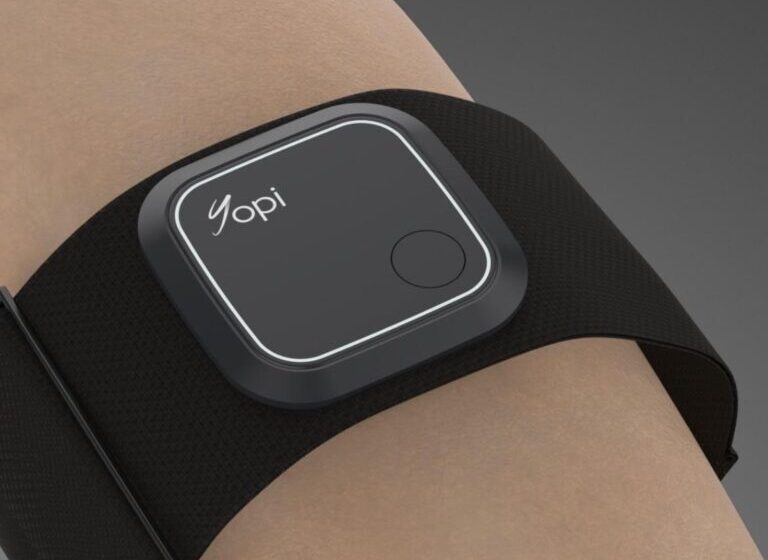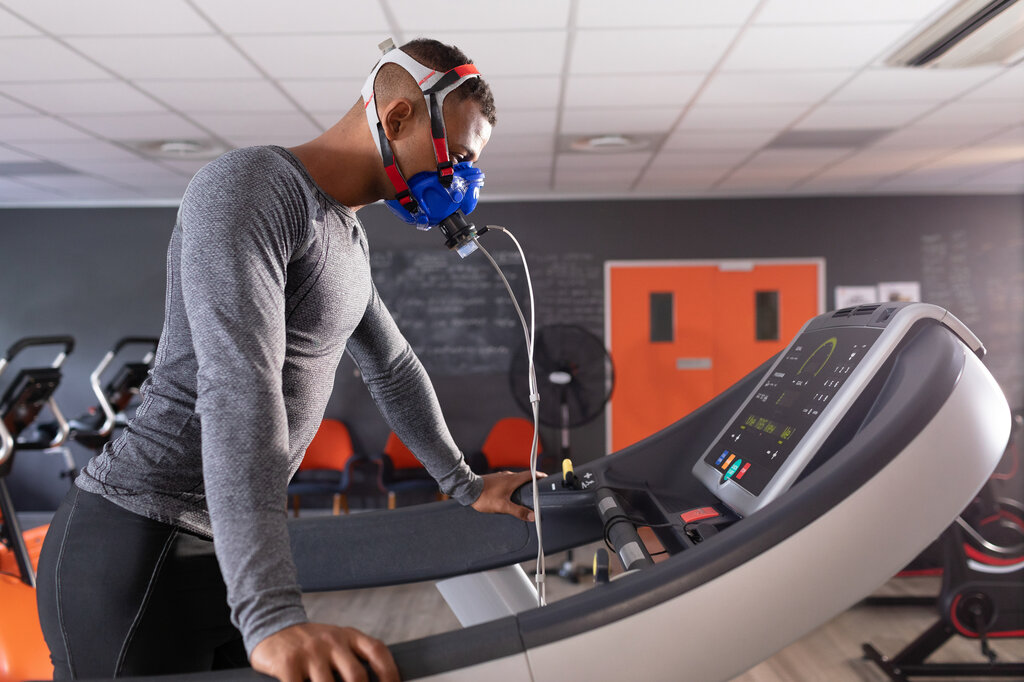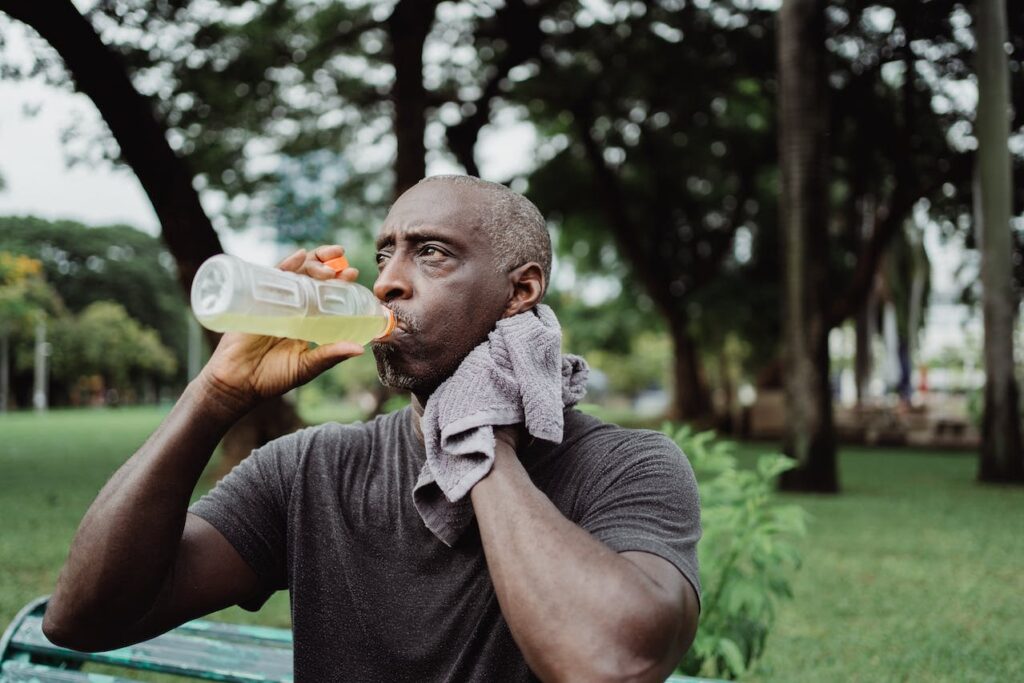Mechanical engineer Hemi Re’em has been an athlete since the age of six. He’s played basketball, swam regularly and competed in marathons, triathlons and even a Half Ironman.
That’s why he was shocked to discover that he had serious heart blockages in three of his arteries. None of his routine tests signaled that something was wrong, nor did the heart rate monitor that he wore every day give any indication.
“I understood then that we were not monitoring our heart health in the right way,” Re’em tells NoCamels.
Drawing inspiration from this experience, he teamed up with Dr. Menachem Genut of Tel Aviv University’s Department of Chemistry to establish the Yopi startup, with the intention of creating a new and more accurate method of monitoring heart health during a workout – specifically by using sweat, even in tiny quantities.

The startup, which is based at Kibbutz Nir Am in southern Israel, spent four years developing a disposable sensor that analyzes potassium and other electrolytes in a person’s sweat as they exercise, in order to determine cardiorespiratory fitness – the body’s ability to supply oxygen to skeletal muscles.
The sensor, which is about the size of a watch, is placed in a band and worn around a person’s wrist as they train.
It measures the electrolytes and sends the data via Bluetooth to an accompanying app, which uses advanced algorithms to determine a person’s VO2 – the maximum amount of oxygen the body can absorb and use during exercise.
The sensor is capable of analyzing the user’s VO2 for 20 hours before needing to be replaced.
And the greater your VO2, the more effectively your body can generate energy and the better your overall heart health, explains Re’em.

The American Heart Association says that VO2 is a potentially stronger predictor of mortality than analyzing established risk factors such as hypertension, high cholesterol, type 2 diabetes and smoking. This is because low levels of fitness are associated with heart disease and some cancers.
“When we get indications that something’s wrong with your heart, we can tell you: ‘listen, something is not working as it used to be and you should go for a check’,” Re’em says.
The Yopi app also interprets the data it gathers to suggest which exercise is best suited for the user, based on their heart health data.
Re’em says that currently the sole method of measuring VO2 is by donning specialized masks used only in physiology labs, sites that are both largely inaccessible and cannot supply a constant read of a person’s VO2 levels.

He says the only other way to measure one’s heart health outside of a lab, clinic or hospital is through the use of a heart rate band, which he argues is an inaccurate indication of a person’s wellbeing.
“A heartbeat is a complicated way to measure fitness,” he says. Even if you are in danger of dying, he says, you can still have a regular heartbeat.
According to Re’em, Yopi is the first to measure VO2 through sweat and in doing so has created a uniquely accessible method of measuring heart health that doesn’t rely on the heart rate.
Sign up for our free weekly newsletter
Subscribe“Until today, there hasn’t been a sensor that can measure [electrolytes in] sweat,” says Re’em.
“To develop such a tool, we had to face the huge challenge of understanding how to measure this,” he says. “And it really was a challenge.”

The principles behind the sensor are based on two separate pieces of research: The first revealed that potassium levels in the blood correlate with levels of VO2; and the second showed that those potassium levels in the blood affect potassium levels in the sweat during training.
“We understood from this research that there may be a correlation between potassium in the sweat and levels of VO2,” says Re’em. And it is the levels of VO2 that provide an insight into a person’s heart health.
The Yopi sensor also analyzes VCO2, the maximum amount of carbon dioxide expelled from the body during a workout.
The app can then analyze the ratio between the VO2 produced and VCO2 expelled, known as the Respiratory Exchange Ratio. This is used to gauge a body’s metabolic rate and can help understand which food groups (such as fats and proteins) provide the most energy.
“You’ll know what your body consumes during training and after the training, you can eat according to what you consume,” explains Re’em.

This, he says, is why the startup is named Yopi – an acronym for “your own personal instructor.”
Two years ago, Yopi received a grant from the Israel Innovation Authority, the branch of the government dedicated to promoting the high-tech sector, and plans on marketing its product in 2024. It will be a subscription-based sports product in which the user will receive an annual supply of 50 disposable sensors.
And further down the line, Re’em believes that the sensor can be miniaturized and integrated into a range of smart watches.
In addition to being a sports wearable, the startup wants its sensor to eventually be used for medical purposes.
As such, Yopi will soon be collaborating with Kaplan Medical Center in Rehovot to create a “sweat bank,” which will investigate whether certain diseases such as cystic fibrosis can be diagnosed through perspiration.

It also plans to complete the clinical trials that will make it eligible for US Food and Drug Administration approval as a medical product.
Above all, Re’em explains, the company wants to help people be aware of whether they have an undiagnosed heart issue.
“This idea is why we developed Yopi in the first place,” he says.
Related posts

Editors’ & Readers’ Choice: 10 Favorite NoCamels Articles

Forward Facing: What Does The Future Hold For Israeli High-Tech?

Impact Innovation: Israeli Startups That Could Shape Our Future




Facebook comments